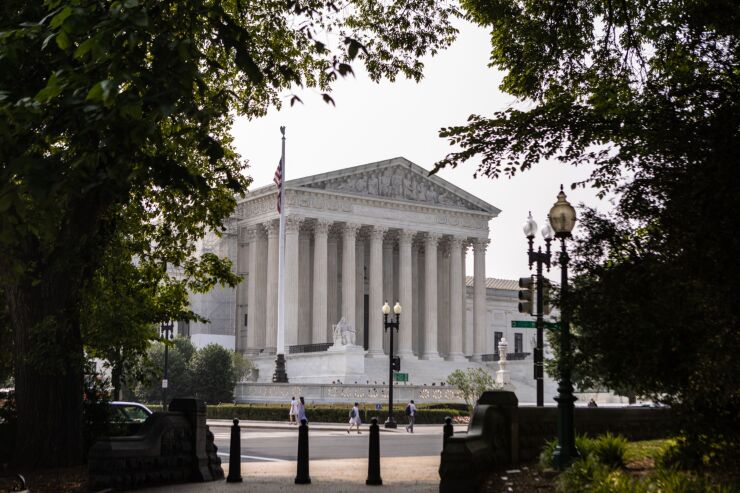
The
As a result of the ruling, timing will not necessarily hinder firms that are filing a grievance, suit or some other form of legal protest against a regulation.
The Corner Post ruling is "momentous," said Eric Grover, a principal at Intrepid Ventures. "It will certainly make it easier for banks and the payments industry and everybody for that matter to challenge regulations," Grover said.
Monday's Supreme Court ruling does not address the merits of any specific law or rule, focusing only on the statute of limitations.
"If there are merchants that came into existence and started accepting debit cards more than six years after the debit fee rules were finalized, they can sue if they think the Federal Reserve's regulation harmed them," said Stephanie Martz, chief administrative officer and general council of the National Retail Federation, which is in favor of Monday's ruling.
The ruling will pressure regulators in cases where rules are designed to
The impacts on financial regulations such as Regulation II are unclear, according to Aaron Press, research director for worldwide payment strategies at IDC, referring to the Durbin Amendment to the Dodd Frank law, which is designed to expand competition for debit card processing.
"The plaintiffs in this case are not opposed to regulation. In fact, they want interchange regulation to be stronger, with lower price caps," Press said. "If they are successful, there is potential for debit interchange to go down. Of course, that potential exists anyway, as the Fed has already said they plan to revisit the issue."
It's possible Monday's ruling could work against the plaintiffs. If the banks or card companies protest fee regulations in line with the new Supreme Court standard, they could win and theoretically raise interchange rates, for example. But that outcome is less likely, Grover said. "Large debit issuers don't, in my view, have a credible argument that the Fed is not permitting them to recover costs via interchange," Grover said.
The Supreme Court's Corner Post ruling followed last week's ruling which set aside the
The Supreme Court's split in the Corner Post ruling was the same as the Chevron ruling, with the court's conservatives — Justices Amy Coney Barrett, Samuel Alito, Neil Gorsuch, Brett Kavanaugh and Clarence Thomas, and Chief Justice John Roberts — ruling in favor of The Corner Post's position. The court's liberals, Justices Sonia Sotomayor, Elena Kagan and Ketanji Brown Jackson, dissented.
Kavanaugh, who concurred with Barrett's majority opinion, said the
Today's interchange ruling adds to the impact of the Supreme Court's Chevron ruling, according to Robert Hockett, a law professor at Cornell University. "Before today, Congress had legislated that regulatory rules become settled law if unchallenged for six years. The Court now tells us that we cannot begin counting those years in connection with any particular affected party until the rule in question actually affects that party," Hockett said. "Since no corporation can be affected before its existence, and since a new corporation can be brought into existence at any time, all one need do to avoid a rule, is to form a new corporation and object to the rule."
Conservative groups such as Charles Koch's Americans for Prosperity, and lobbyists including the U.S. Chamber of Commerce backed the Corner Post.
"This decision is a tremendous win for individuals and businesses who have been subject to problematic regulations but were barred from challenging them because of the passage of time," said Kara Rollins, litigation counsel for the New Civil Liberties Alliance, a civil rights group, in a release.
The Biden administration, which represented the Federal Reserve, argued that The Corner Post's position would expand the potential class of challenges to government regulations and would stress the courts and agencies.
"The Supreme Court dealt a blow to people and communities across the nation, opening up a Pandora's box of attacks on settled policies and regulations that have been on the books for years," said Skye Perryman, president and CEO of Democracy Forward, a nonprofit legal services firm, in a release. "With today's ruling, we can expect to see a flood of litigation by special interests challenging any policy or regulation that doesn't fit their short-term agenda, even years after the fact."






